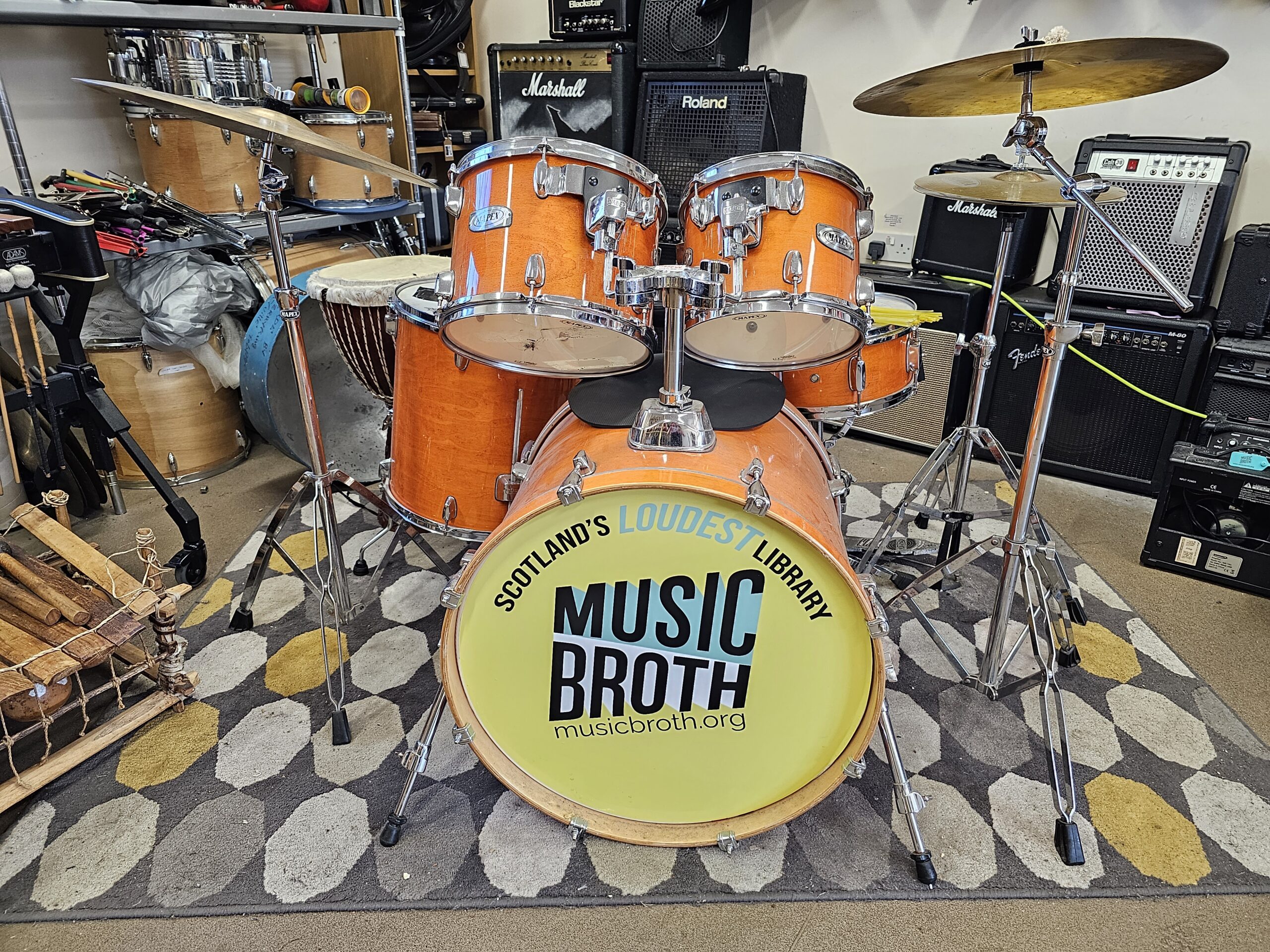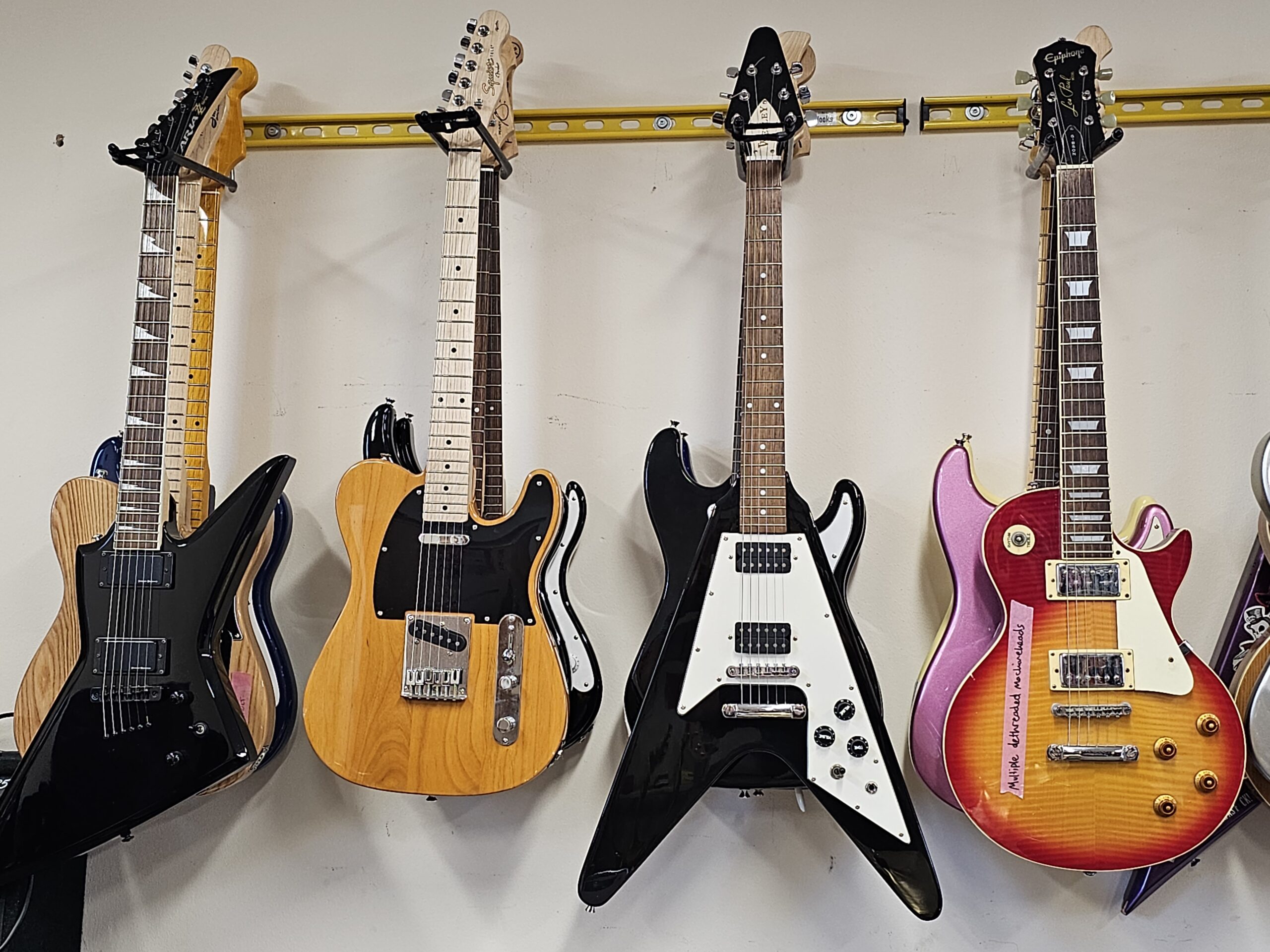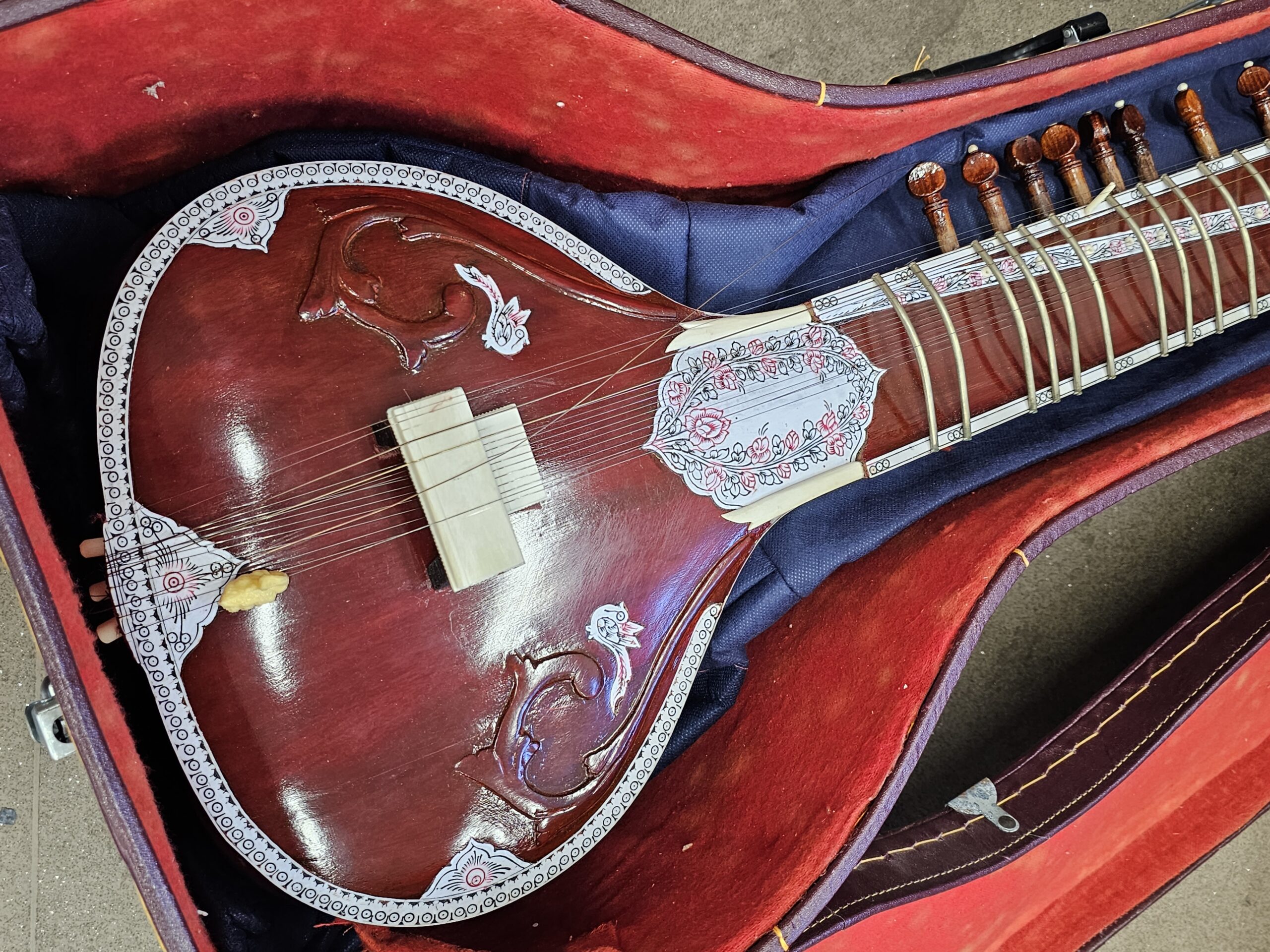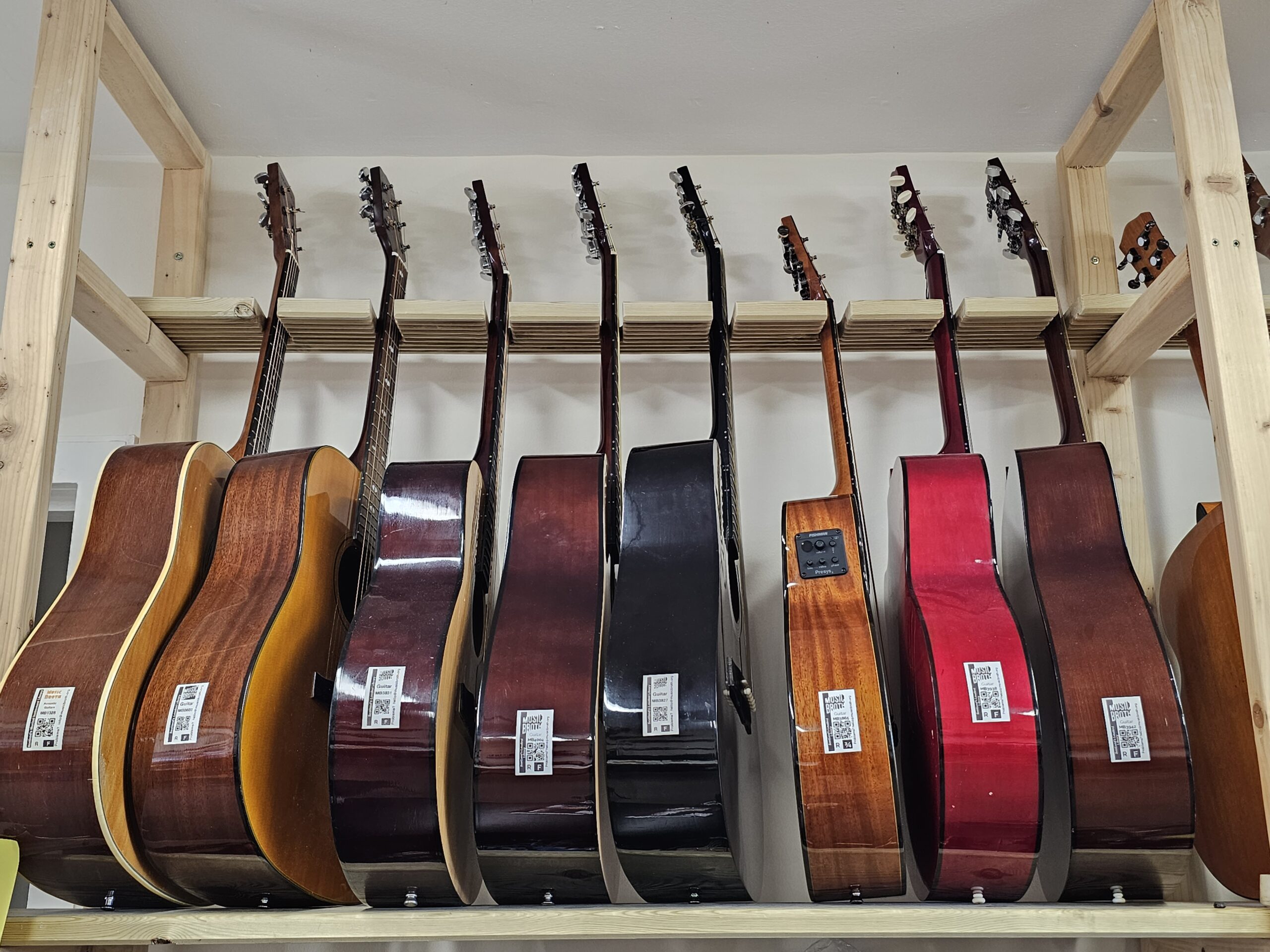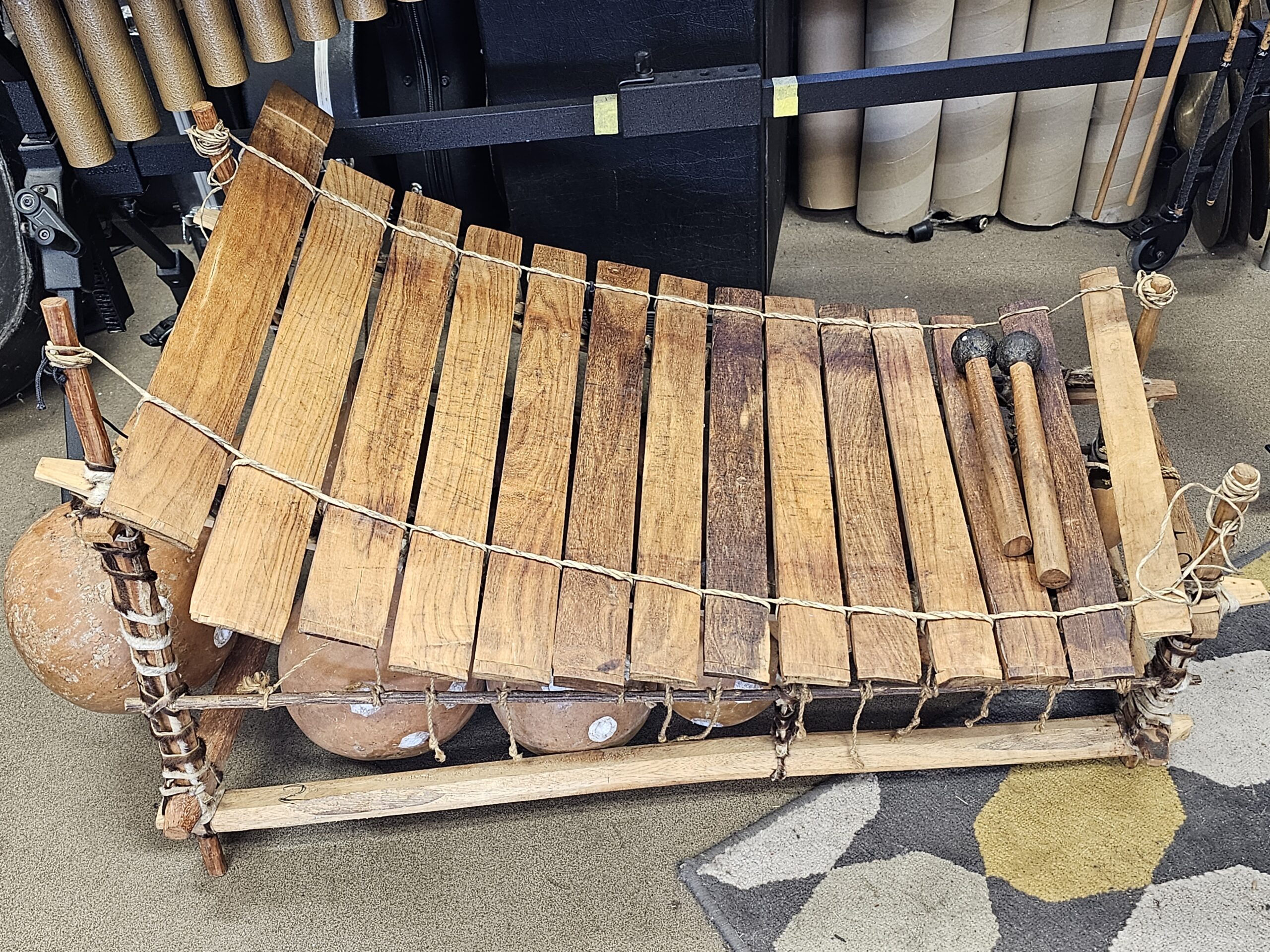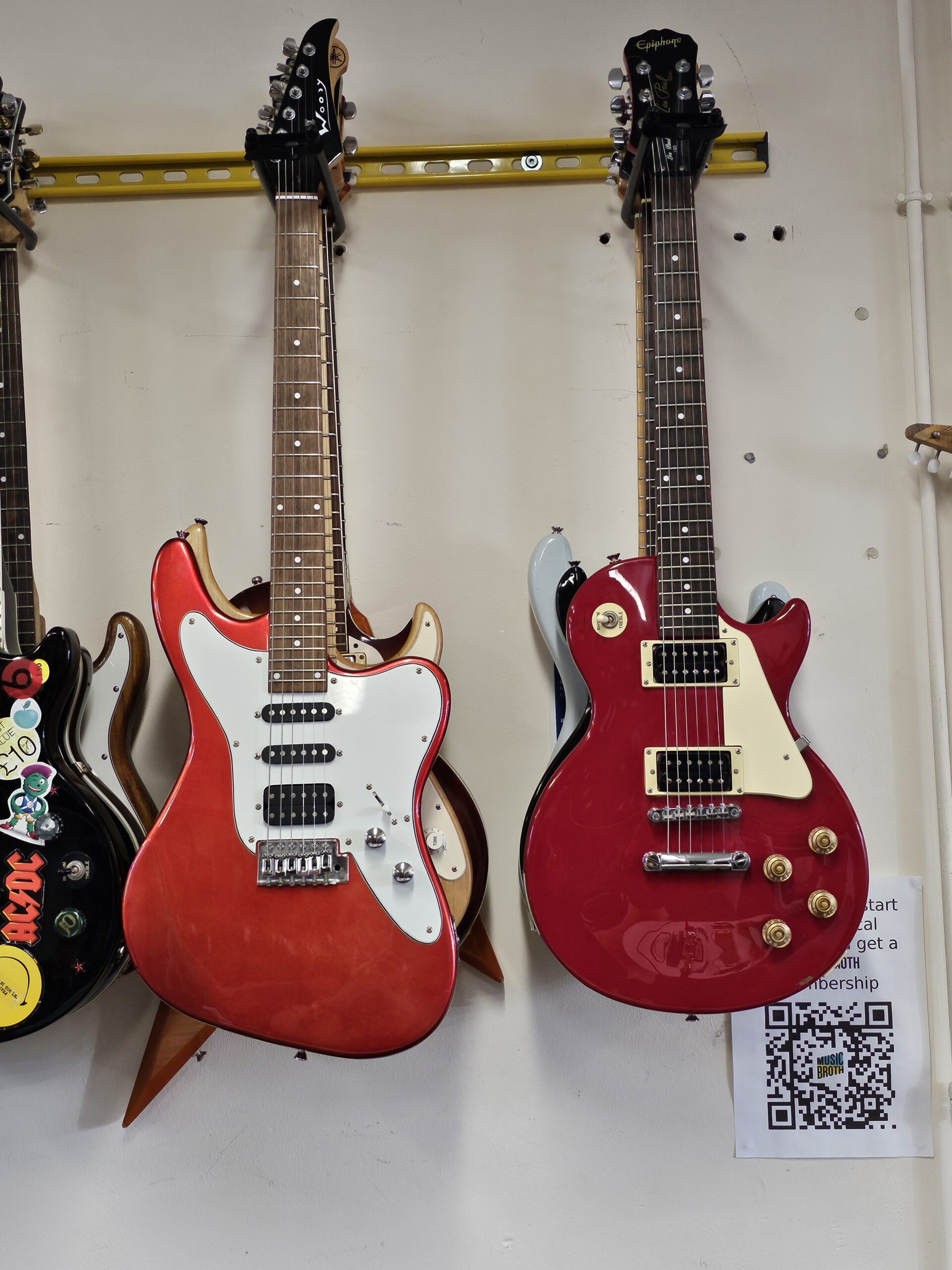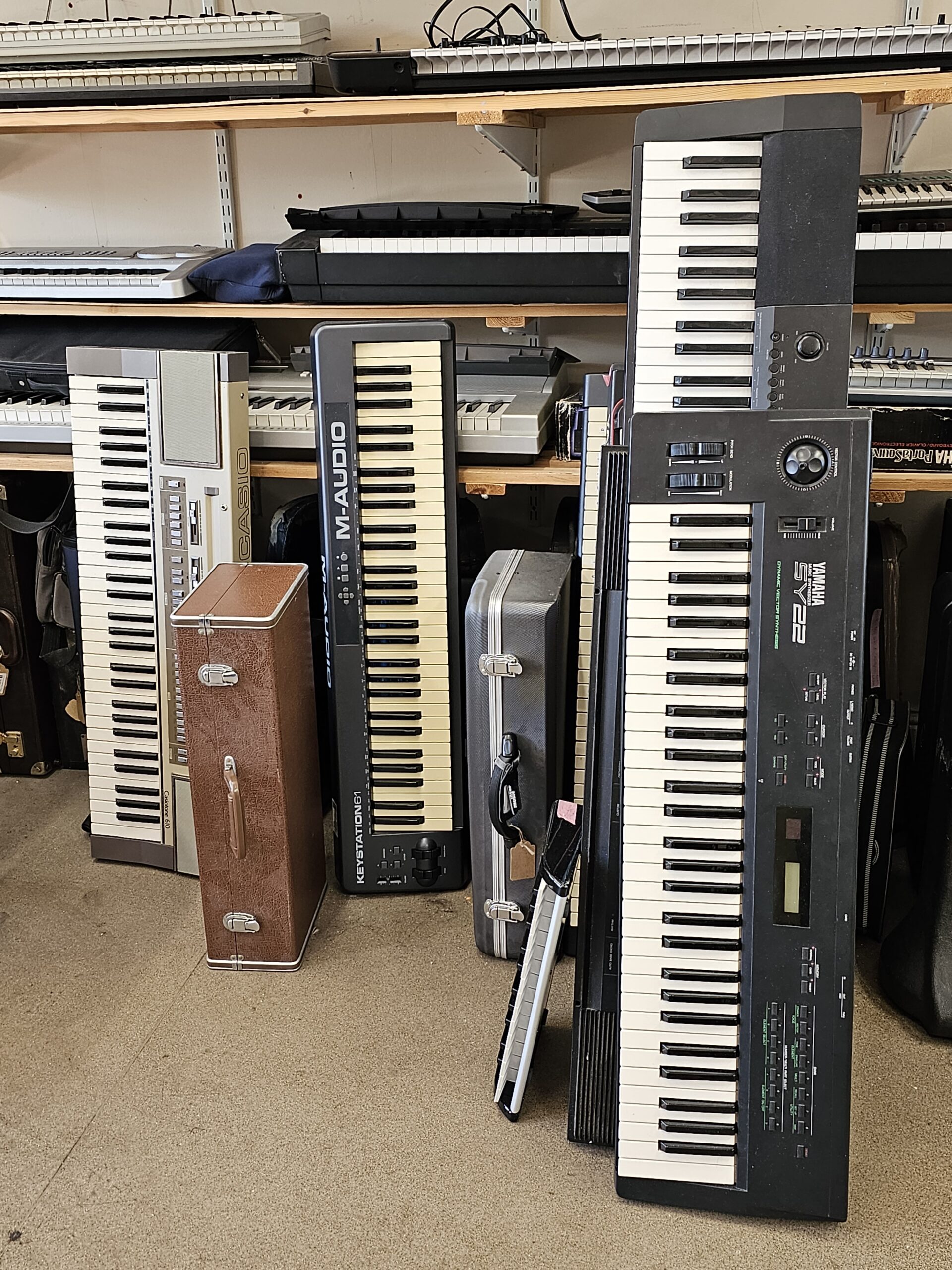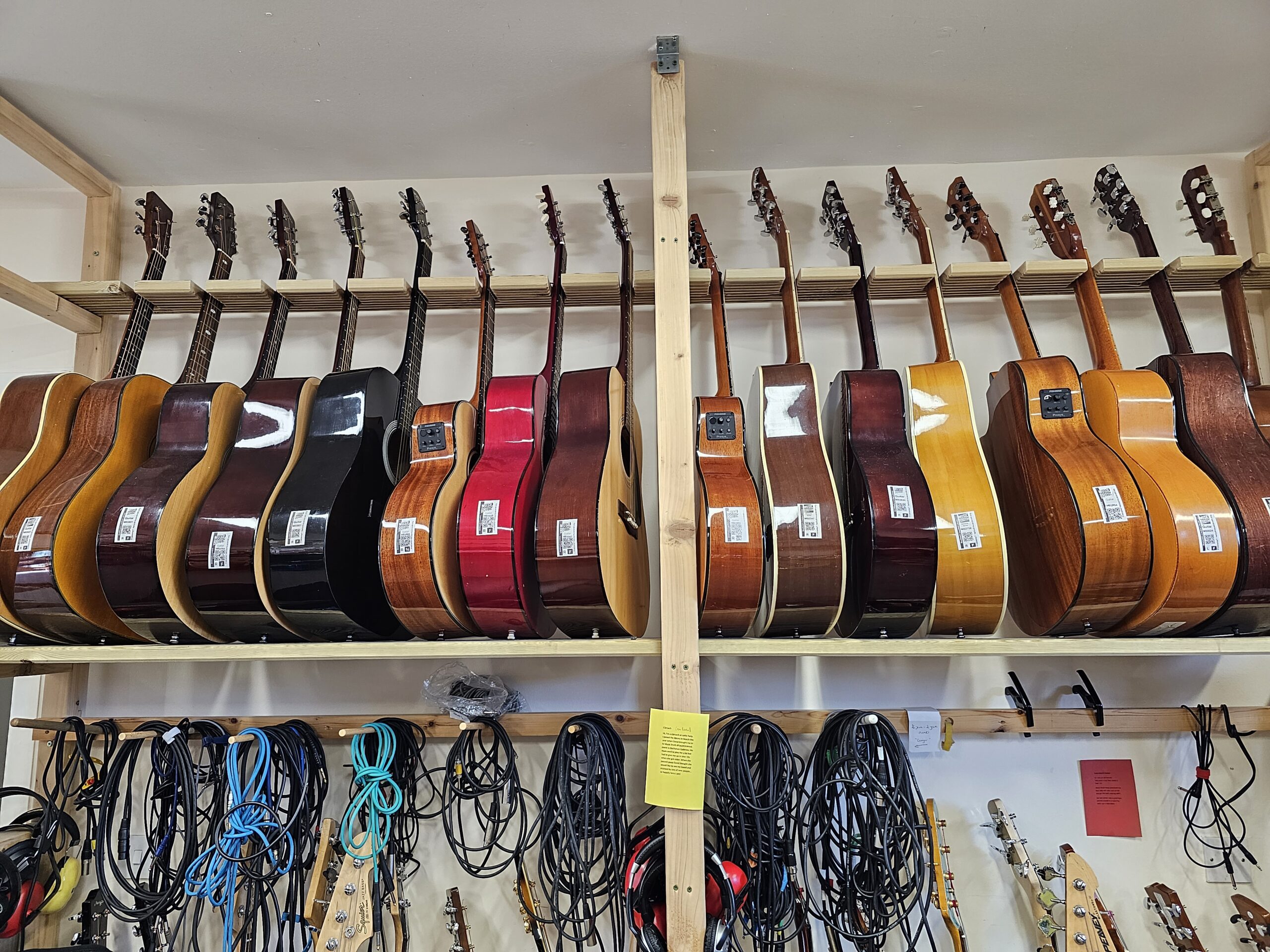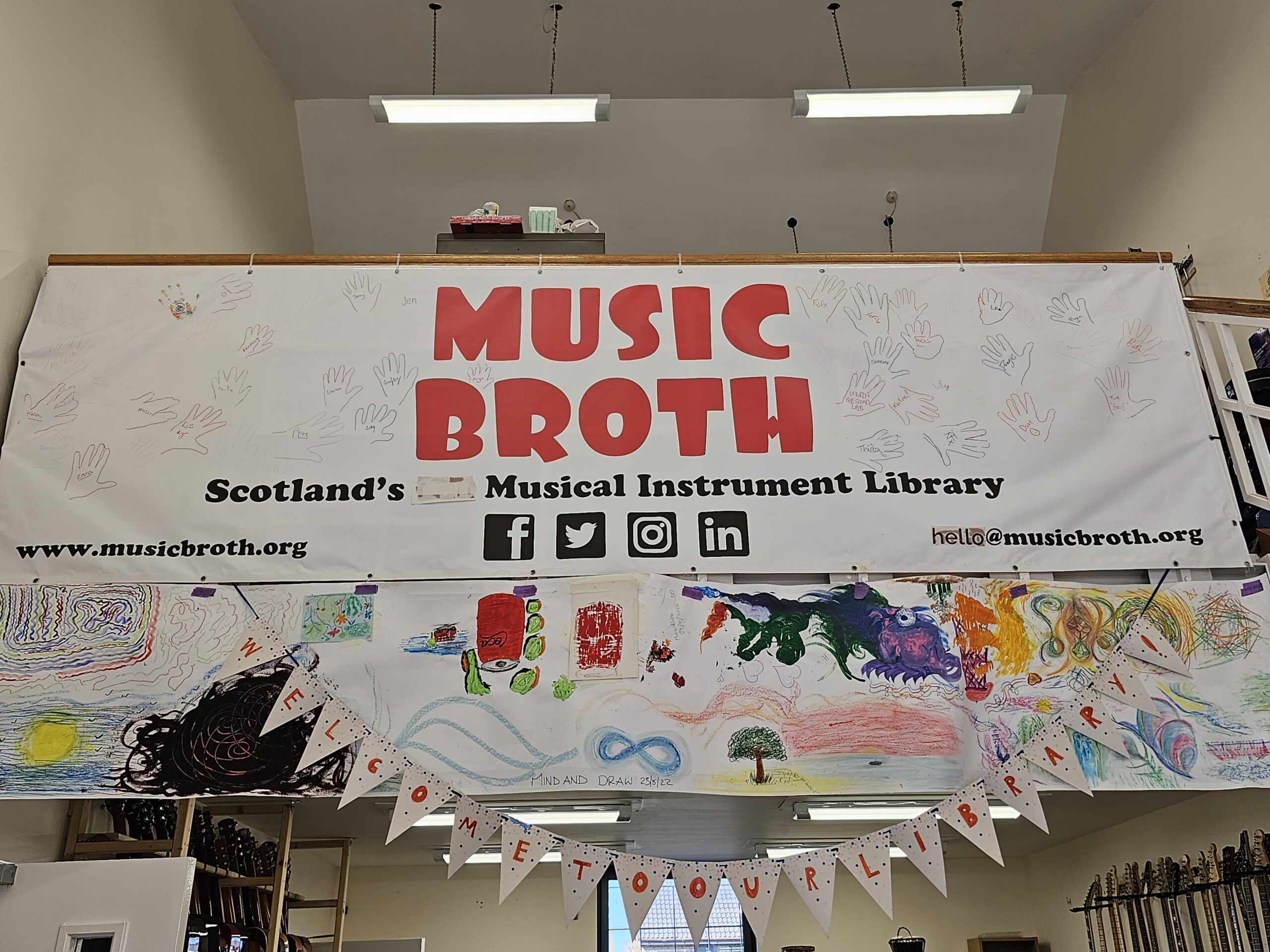Now and again you meet someone who is full of passion and commitment for what they do. When this is aligned with a social enterprise and is within the creative arts, it’s even more fascinating to dig a little deeper. Jen O’Brien is one of the Co-Founders of Music Broth, originally a musical instrument lending library but now so much more. I travelled to Govanhill in Glasgow to meet with Jen and her colleague James Bajgar. To know that Music Broth is a net zero waste organisation provides an initial insight into their ethos. For example unused guitar strings are used to make jewellery and they are currently trying to find furniture makers who could teach them and their volunteers how to upcycle some of their larger items into items of furniture. sat surrounded by hundreds of instruments I had an in-depth discussion with Jen, who, amongst other things, wants to show people what is possible and what they can achieve.
How did Music Broth begin?
We started in 2017. There was two of us and we met at a music event. They had been left eight instruments in a bereavement. I was just breaking up with my band so went to the event to meet more musicians. We started chatting about how we could share instruments and came up with the idea of a musical instrument library. We started thinking about how we could share instruments and did lots of research. We went to different bands, different organisations, brought flipcharts to very uncool places to bring flip charts! We asked would you use this? What would work for you? Could you afford it? We started putting feelers out to see if there were instruments that people would donate into the library that we could share, and the response was amazing. We were part of Pass It On Week, part of Zero Waste Week in Scotland for Recycling and Reusing in April 2018 and we took in 85 instruments in a week. We put on a nine-day event in Buchanan Galleries because we’re completely mad. I think we had 45 musicians performing and lots of different workshops. We did a fundraiser with a food bank locally in Govanhill in the Govanhill Parish Church just before Christmas 2017, and in April 2018 we put on this massive event.
I think we had about 40 Volunteers getting involved as well. At that point we knew that it had potential and we were still storing instruments in spare rooms and then we stated looking for a physical space for the library and we moved in here in Govanhill in July 2018.
So the original model when you started was that you’d take in donated instruments, fix them if they needed it and then lend them out.
Yes so the person I started this with they had the eight instruments they had been left but thought they can’t play them all at the same time, this shouldn’t be in my house, how do I honour my uncles legacy? For me I’m the oldest of five kids and I’ve always been musical. We were encouraged to do what we wanted to do but there was never spare cash for instruments or anything like that. So my music came from me just doing things myself. We just thought to give other people opportunity would be great. If you want to play a cello and you don’t have £450 then you could borrow a cello for a bit and if you’re nine and decide you want to do saxophone next then get a saxophone next. That was the idea behind it in.
This in here is about a third of what we’ve got! We have over 3000 items now! From tin whistles and recorders all the way up to full drum kits and studio drumkits and proper big festival amps. It’s expanded quite a lot.
Was there a point when you realised you needed to look at the funding side of Music Broth?
When we were first loaning out instruments to people they were coming back to us and saying can you teach me how to play it. That’s when we realised. We have a membership scheme, but we try to keep our membership affordable. It’s been the same since we started, £6 a month and that’s based on what people told us at the time was affordable. And even if people can’t afford it we look after them. And we wanted to be really ethical and pay musicians the going rates for their time because we think music should be a valid career – that is really important to us. So we realised that just the membership and the rental of the instruments wouldn’t pay for hours of musicians teaching and so that’s when we started looking at more funding for that side of things.
Music Broth is a social enterprise with charitable status so we can apply for grants which are available for charities as well. And we abide by OSCR the charity governance association, so they audit our accounts, which we like them to do because we want to be transparent in what we are doing. We didn’t want to charge people to have lessons because the whole ethos is to make this accessible for people so we started looking for some grant funding to start supplementing that side. I have a bit of experience in that kind of work.
Do you have lessons take here now?
On a Saturday we have guitar and ukele lessons for beginners and improvers for about four hours Then drums on a Monday and a Wednesday. Also we have a weekly jam session where anybody can come in and use anything and make music together on a Thursday evening. Then we have a couple of groups that use our space that we partner with. We have a Trans Jam session on a Wednesday night for trans and non-binary people and a Survivor Arts Community Choir here on a Thursday night. They work with female identifying people who are survivors of domestic violence or sexual assault. They come in on a Wednesday and work with our song-writing tutors and write their own songs and perform their own songs which is very cool.
Do you feel you have gathered a real community around the space and what you are doing?
Absolutely. The door is open and we want people to come in and pick up stuff and try it and have a go. You don’t have to be musical as such to do what we are doing. Its more about a community space and being creative. We have some folks who volunteer with us who are not musical at all and they do stuff like social media, or come in and fix guitars. It could be a quiet time for them or it could be a social time that they come in and make new friends. Particularly coming out of lockdown we’ve seen people coming back and getting more social skills. We have people who were very shy coming in here at first and now we’ve got a couple of bands who have formed.
It’s so important. Look at the Ezra Collective recognising youth clubs, which don’t exist as much as they used to.
I grew up a rural place in Ireland and there was still a youth club that was run by your aunties and uncles but it was still a space for young people to be. Now its shopping centres which is horrible, with capitalism just shoved in your face the whole time. If you are a young person who doesn’t have much cash where do you go? You have to be quiet in the library, but you don’t have to be quiet in this library. We call ourselves “Scotland’s Loudest Library” on purpose – come here and make some noise. Be yourself, we really encourage people to be themselves.
So what we do has expanded based on what people want us to do. If people come with an idea we will run with it. We do beat boxing, we do music production workshops, we did DJ workshops last year, because that’s what people wanted to do. We did holistic vocals about looking after your voice, about finding your own true voice in your vocals. So if you want to sing arias or you want to sing death metal, this is how you look after your voice and understand your vocals.
These are ideas that others had expressed and you then facilitated them and make they happen
Yes, 100%. Even Survivor Arts Community Choir they came to us and talked about the idea of setting up a choir so we said “Yes, let’s do it”. Trans Jams is the same, they came to us and said they needed space to practice so we said “Yes”.
Credit: Julia Mason
And am I right in thinking that you have PA systems too?
Yes, we actually did that from the very start. 99% of what we have in the library is donated but we actually bought a PA system at the start when we didn’t have enough money to buy a PA system! We thought if we can hire this out it will make extra income for what we do. So we got a really good PA system, its excellent and paid for itself in a few months. The ethos is that if someone is putting on an event or something like that to come and kit from us backlining for a gig means that that is going back into future musicians and supporting the community so it means we can do more from getting that hired out.
We’ve had a band come over from Canada and take a drum kit on tour. We’ve had a touring theatre group from America take some of our stage kit on tour so it’s really cool when things like that happen. We can provide a bespoke service which is music centred and getting the best out of someone’s music performance. We can support events and it means that the income comes back into the community through us plus we’re reasonable and we’re flexible. We’ll help people choose the exact things that they want.
Looking back what has really taken you by surprise since you started?
The main thing that has been really wonderful is just people getting involved. People are just really interested and we’ve been supported by amazing volunteers, from the very start. We have a team of session workers and we pay all out musicians and tutors the correct rates and we cover peoples expenses. But there are people who just want to volunteer their time and they’re maybe not able to work in another capacity. We have a lot of people who have additional support needs that we are really happy that they are part of our team. They are maybe not able to work in a traditional work situation but they can come in here and do a few hours a week and feel safe here. Also the generosity of people bringing instruments in. When you look back you realise its really grown, but when you’re in it you just do the next thing and next thing.
The way Music Broth has evolved has very much been due to other peoples input, which you couldn’t have predicted. That must be wonderful.
Absolutely. There are so many different scenes that we’re now part of it. There’s an amazing electronic and music soundscapey scene out there that we didn’t know was a thing at all and there’s some really amazing talented musicians in Glasgow producing work like that. Its been really fun and they’ve taken out different instruments from our library so they can get weird sounds into their music. So that’s fascinating to be involved in, and for them to then credit us on maybe on a record they are putting out saying they have had instruments from here.
Going back to the very first event in the Buchanan Galleries we saw this guy Liam (“L”) who was in college at the time. I’d never seen Beatboxing live before and I was blown away, so I said can you come back? And we’ve developed this partnership. In a weeks’ time it’s the Scottish beatboxing championships, the third year in a row and we’ve worked with them to develop that organisation as well. It’s like a sister organisation borne out of what we’re doing. We’ve been growing together and I’ve been a sounding board for them and we host their ticketing on our website.
Music Broth has two locations in Glasgow
This is Music Broth South in Govanhill and there is a north site in Sighthill. That’s more a warehouse type of space. Everything in here should be ready to pick up and play. The north site is more longer term fixes, big bulky kits that go out for festivals etc.
And in Edinburgh you have a drop off point. Is that right?
We have a partnership with Edinburgh Tool Library. They set up before us as a library of loaning things, and have been a fantastic support to us just understanding just how all of that works – what software and systems they use, what works for them. Last Monday of the month we are over there and people can order instruments online as we have an online catalogue and then we will bring it to Edinburgh on the last Monday of the month and people can them pick up from there. People can also donate there too and full details are on our website.
So looking forward are you currently working on any new plans?
We’re always in the planning phase and we’re always accepting of ideas from people who walk through the door and what they want to do. But we have started a partnership in Fort William with The Buzz Project. We have been up there doing some workshops with their young people and they have about 30 instruments from us just now. There are massive issues in the Highlands with unemployment and mental health for young people so we’re trying to make a difference up there as well working with those guys.
We’ve also started doing some work in Orkney as well! It fledgling but we’ll see what happens with that but we would work anywhere in Scotland. We started a bit of work in Argyll and Bute, have done some work in Renfrewshire and in the Lothians.
We’d love to have more instruments out to more people in more places. We want some here of course so people can come in and pick up but ideally we want more to be out. If there are people out there in a group and need guitars, give us a shout because we have the stuff. We do organisational partnerships with organisations that operate across Scotland, Epilepsy Scotland, LGBT Youth Scotland, Families outside who look after young people whose parents who have been incarcerated, with the signing community. So if there’s a group out there that think they could do with instruments or with someone coming along and doing a specific workshop then give us a shout.
What is the main challenge that you face at the moment?
Logistics and funding. Logistics as in we get the instruments in and it takes a while for us to have the space and time to process and get them onto our system and then out to people, so that’s ongoing – not physically getting things to people, its more the work flow. And we now have so much that if we don’t have the exact thing that someone wants or its out on loan we can get a replacement.
Also we do try to help people. We’ll ask “what kind of sound are you looking for?” and try to supply what will work best. People will say they are putting a gig on and James will say “Have you got a singer? What kind of genre are you playing?” And we’ll help them to work out what’s going to help them sound good.
Sometimes it’s not repair not testing but researching the items that come in as a donation takes the time. We can spend collectively 6 or 7 hours just researching it because we get some interesting pieces that have maybe unclear histories. Then there’s the checking it out, the repair, the maintenance and our volunteers give a lot of care and attention. There is one example where a volunteer has been able to do a lot of the physical work but hasn’t able to do the electronics so part of the process of that repair is that volunteer receiving training on ie how to diagnose electronic issues, soldering.
You are providing skills for volunteers.
Yes, and for example with amps people will take to the repair shop and they will say its not worth fixing it, you’d be better off buying a new one because the cost of fixing it is going to be more. And that is true and people should be paid correct labour rates for repairing stuff but it means that things are getting chucked out so we will do that. It takes time but we will take the time to do that and maybe teach someone else hoe to do that at the same time. We are trying to spread the repair skills. In terms of logistics, it’s a little bit of a slower process. We’re not really about quick fixes, we’re more into the long-term sustainability of the organisation, and of the planet.
You generally now have everything that someone could ask for.
We didn’t have a triangle for a while but we’ve got one now! We have a sitar. We’ve got a double bass which is very popular, and a West African balafon.
My final question, how do you have enough hours in the week to do everything that you’re doing?
This is what I want to do. There is no day that I get up and think “I don’t want to go to work today”. James is brilliant at organising things and is very thorough and keeps us all right in terms of electrics, PAT testing, safety and such. We work really hard, but we also try to make sure we look after everybody as well. One of our volunteers calls it her family and it is like that. If people aren’t well, they get proper time off. We’re shut on Wednesday and that allows everyone to go and do their own thing. I’m a musician as well, James likes climbing. We close Wednesday but we might be working Saturday night at a gig or all day at a festival.
And then someone comes along and says thank you, or that the talk you gave is just what I needed at the time, or someone tells you they’ve just learnt ‘Jolene’ on the ukulele and they’ve always wanted to do sing that and that makes all the difference. Or you go and watch young people who have learnt stuff with you and they go and perform for the first time their own original songs. That feels good.
It’s not hard when you’re doing something that means something to people. Of course there are times when its financially hard and stress levels are tough but there’s no point if you don’t want to do it. It’s just figuring out those things. We’re quite practical people. When we first moved into this space we had a few hundred instruments and I remember looking at it and thinking are we ever going to fill this place and how are we going to afford the rent. There was lots of times when we jumped off the cliff a bit and hoped for the best, and its going alright, so far. It’s going pretty alright.
For more information on Music Broth including their locations, events, how to donate and what services they offer please do check out their website.

